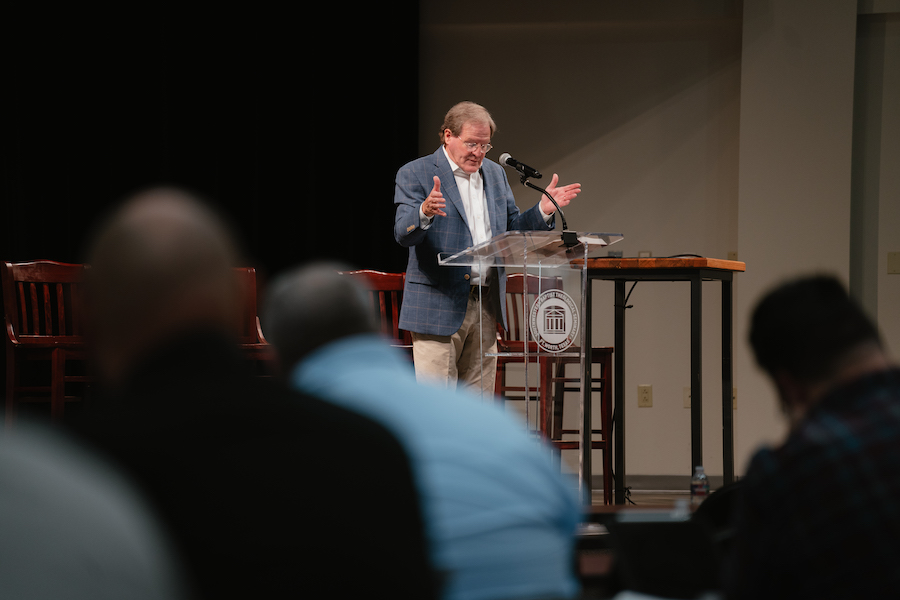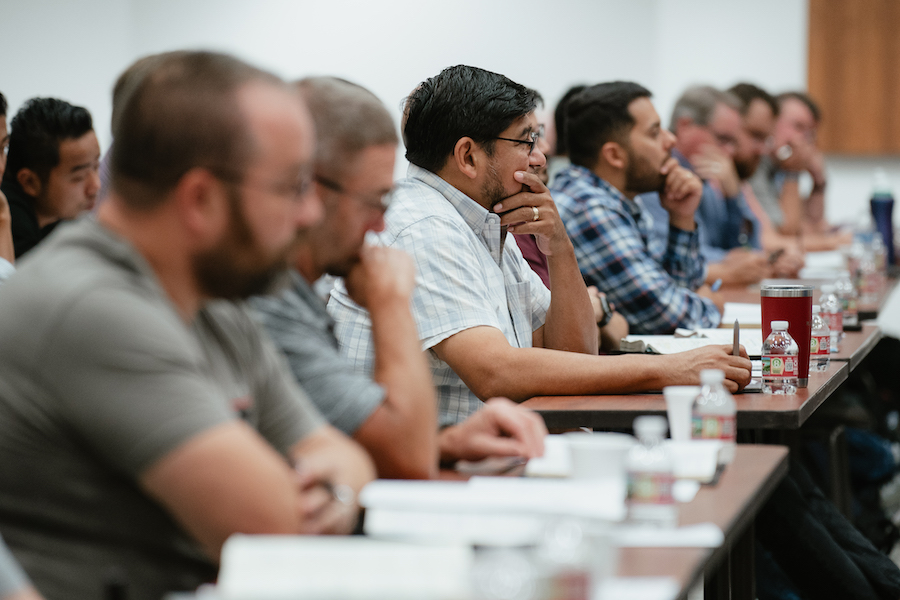Southwestern workshop offers guidance on preaching 2 Corinthians

Preachers and students who aspire to be gathered for the annual Effective Preaching Workshop at Southwestern Baptist Theological Seminary, Sept. 30. Five speakers worked through 2 Corinthians, each one bringing their own unique styles and approaches to the task with counsel on how to preach the New Testament book.
“We want this to be a real help for pastors,” said Matthew McKellar, professor of preaching, of the annual event. “We want this to be a one-day event where a guy can come and hear a clear, effective teaching on [preaching] through a particular book. He can go home at the end of the day and have a head start on what he needs to do.”
This year’s workshop undergirded that goal by bringing together several pastors and seminary faculty to present a variety of ways to preach through a book of the Bible. McKellar covered the first two chapters of 2 Corinthians.
He began with a thorough introduction to the book of 2 Corinthians, covering the historical context surrounding its conception at the hands of the apostle Paul, as well as what was occurring throughout the letter as Paul received reports on the happenings at the church in Corinth. McKellar talked about the city of Corinth and the issues that plagued it before beginning to delve into the first two chapters of the book.
McKellar emphasized the theme of “comfort in crisis” that faith in the Lord provides, affirming the adequacy of God’s comfort for every circumstance in life. He spoke of not being ignorant of affliction, but to remember God’s mercy through that inevitable reality.
“In his fatherly love, God meets us in our affliction, like a dad scooping up a child with a skinned knee,” McKellar said.
He spoke of the importance of sincerity when people and plans fail. While McKellar warned against harsh discipline which sets a limit to the grace of God, he encouraged the exercising of biblical church discipline.
Finally, he encouraged the celebration of the consistency of the character of God, despite the ever-changing circumstances of the world, reminding listeners the relevance of truth, and that the battle has already been won, that believers “do not fight for victory; they fight from victory.”
Keith Collier, senior pastor of First Baptist Church in Groesbeck, Texas, and PhD preaching graduate of Southwestern, preached from 2 Corinthians 3:1-5:10, explaining that he had preached from the letter with his congregation earlier this year. He described the overall meaning of the book as “strength in weakness.”
Diving into his passages, he focused on the concept of enduring hope, saying, “Through the New Covenant, we have an enduring hope that empowers us to endure until the end.”
Collier chose to break down his chapters verse by verse, speaking on the relevance of each and the lessons which they taught. He encouraged the power of spending time with the Lord and having boldness in praying for others as “no one is too far out of God’s reach.” Collier further described how faith in Christ motivates us and encourages us to remain steadfast, not giving up.
“In Christ, we have the confident hope of an eternal dwelling that fuels our endurance,” Collier said. “… Run the race with endurance in such a way as to win the prize.”

Effective Preaching Workshop attendees heard from pastors and faculty who gave examples on how to preach through 2 Corinthians.
André A. Kirkland, who covered 2 Corinthians 5:11-7:16, earned Master of Divinity and Master of Theology degrees from Southwestern and is a PhD student in practical theology at Mid-America Theological Seminary in Memphis, Tennessee. His lesson focused on a broader view of the chapters, as well as the specifics of the Greek translation.
“To Paul, the Christian is in Christ,” Kirkland said, senior pastor of Mt. Hebron Missionary Baptist Church in Garland, Texas. “And therefore, the old self of that Christian has died, and he arose a new man.”
He spoke of the great love of Christ for all and the call to be “ambassadors for Christ,” emphasizing the role of an ambassador as a messenger and a representative at the same time. Kirkland also spoke of Paul’s urgency to unbelievers to receive God’s grace and his urging of believers to respond to the grace God had shown them, adding that believers can rest in the love of Christ, knowing their value comes from God.
“God is calling us to be ourselves before Him,” Kirkland said, “and to recognize that only He can ascribe and communicate what our value is. We tend to value ourselves based on persons, places, and things, but God is causing us and calling us to value ourselves based on Him.”
Clay Smith, senior pastor of Johnson Ferry Baptist Church in Marietta, Georgia, and PhD candidate in preaching at Southwestern, lectured from chapters 8-10, focusing on the role giving plays in the life of a church, a pastor, and a believer.
He explained that chapters 8 and 9 are claimed by some as separate entities in themselves from the rest of the book, as they focus so heavily on the “relief offering” Paul is collecting for the saints in Jerusalem.
“It is my position that these two chapters are to be understood as original to the letter,” he said. “And that, while Paul does address a new topic, it correlates to the defense of his ministry as a whole.”
Smith elaborated on the concept of the “Jerusalem gift” and explained the Jerusalem Christians were in desperate need at the time, prompting Paul’s appeal for a relief offering. It was ironic, Smith pointed out, that the Corinthian church was one of the wealthier churches at that time, yet was not the most generous.
Smith used these chapters to speak on the importance of encouraging a congregation to give and be generous in works for the Lord and His kingdom. He concluded that while the topic of giving can be awkward to approach before a congregation, it is an important part of any ministry that must be addressed to promote unity and growth in the body of Christ.
Chris Osborne, professor of preaching and pastoral ministry at Southwestern, led the final lecture-sermon, speaking on 2 Corinthians 11-13.
“These last two chapters express Paul’s deepest passion for this church,” said Osborne, the former longtime pastor of Central Baptist Church in Bryan/College Station, Texas. “He believed reaching the urban centers of his day would move the Gospel to the rural as well. If this church is lost to the faith, the impact in the area is profound.”
He emphasized the importance of devotion to Christ, warning that the world will challenge that devotion. Osborne also said knowledge will always be more important than eloquent speaking, pointing out that Paul’s understanding of Christ was vastly superior to his ability to convey it through words.
Osborne spoke on the need for churches to rise above the morals and values of their cultural context and to avoid complacency and corruption like that which had befallen the Corinthian church. Concluding, he warned against arrogance taking hold of a teacher’s heart while emphasizing the importance of holiness in their own lives.
Notes from each speaker’s lecture can be found here on the Preaching Source page of the newly launched Equip The Called website.
The next preaching workshop will be held on October 6, 2025.



